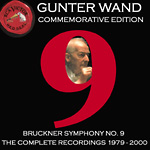RCA’s impressively swift response to the death of Gunter Wand has righted a wrong I addressed on this very website: namely, the company’s deletion of previous Wand Bruckner Ninth recordings as each new one appeared. It was a vaguely Orwellian policy that asked us to believe the only Wand Bruckner Ninth that existed was the most recent one. Now with all five Wand Ninths presented in this handsome slipcase box, chock-full of concert and session photos, and including an exhaustive 25-page essay by noted Bruckner writer Richard Osborne, we can appreciate Wand’s achievement in toto.
Well, not quite. As it turns out, Osborne reports, Wand had actually planned to make nine Ninth recordings in all, forming a sort of 9 x 9 palindrome that would have embodied the nine states of consciousness engendered by this great, mystical work. These are, in order of appearance, I. Confidence II. Uncertainty III. Arrogance IV. Materialism V. Individualism VI. Clarity VII. Peace VIII. Enlightenment, and IX. Transcendence. Alas, only five of these were completed, but they are a magnificent group of performances, each distinguished by its own unique interpretive mindset.
To cite just one brief but pivotal passage–the horn call that rises from the mist at the start of the first movement–is to discover the whole of the variety-in-unity characteristic of Wand’s approach. In Wand I (with the Cologne Radio Symphony) the horns play brazenly as the conductor moves the tempo forward. The all important high note, the long B-natural, rings forth for its full value, but nothing more. However, in Wand II this has all changed. The North German Radio Symphony horns sound more diffuse and don’t quite muster enough focused energy to fully break through the gloom. (Uncertainty indeed!) Then, in Wand III, the clarity has returned, but instead of mere brazenness the horns carry a sense of defiant foreboding–the B-natural is now very long, in self-serving disregard of Bruckner’s notation.
For IV Wand choose the Berlin Philharmonic which, with its famed surface polish and glitter, perfectly realized his “materialist” interpretation. Here the horns sound immaculate, too perfect, as if they were hiding some deep, dark secret. Finally, in Wand V we return to the NDRSO, with Wand in a grim mood, determined to go his own way. A wizened anger permeates the reading, especially the tremendous crescendo on the all-important B-natural.
There are other fine points of interpretive departure–V’s swelling timpani at the first movement close, IV’s glimmering strings at the end of the adagio–but suffice it to say you will need all five extant versions to fully appreciate the genius of Wand’s Bruckner Ninth. As for the remaining four unfinished recordings of this unfinished symphony, sadly Wand fans can only speculate on the astonishing insights that were yet to come. Richard Osborne conjectures that upon the Ninth Ninth recording Wand expected to transcend the physical limitations of the score, and thus be able to “finally divine the completion of the finale.” It’s questionable whether Wand really believed this, but I must admit that after listening to all five performances in a row, I was good and ready to “transcend” myself.
The recording quality naturally improves as the session dates move closer to the present day, but RCA has done an excellent job at remastering the earliest ones, particularly the great, first Cologne performance. This release proves once again that RCA does death well, first Elvis, then Heifetz, then Rubinstein, then Ellington, and now this.
































